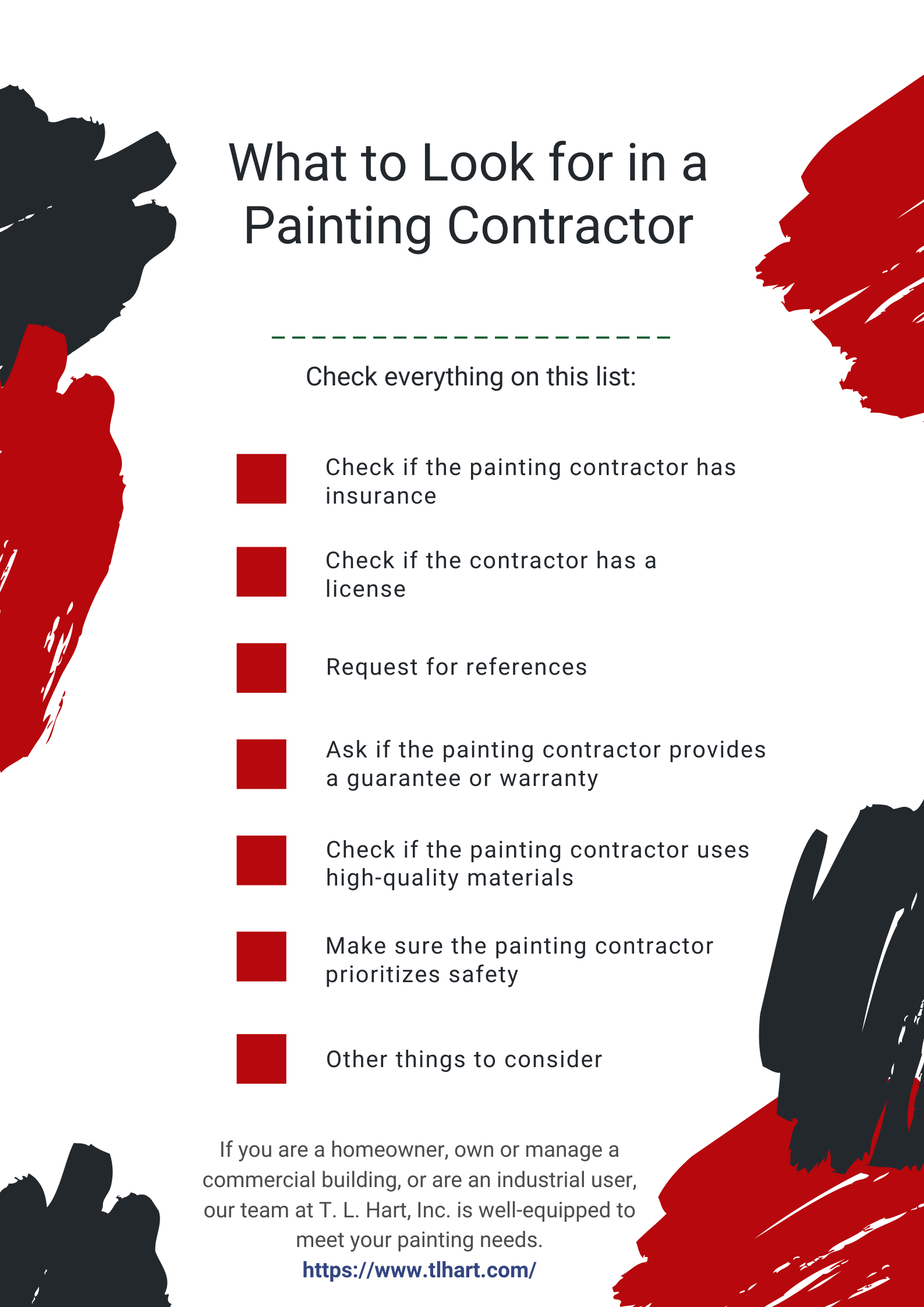What to Look for in a Painting Contractor

A lot of commercial property owners take painting for granted, but a fresh paint job has the ability to instantly transform the look and longevity of their building for years to come. However, that largely depends on the paint contractor they hire. Hiring the wrong contractor for the job can cost you both time and money.
Before you hire a painting contractor, here are some things you need to consider.
#1 Check if the painting contractor has insurance
Before hiring a contractor, make sure they have general liability insurance. This ensures that your property is protected from damages caused by the contractor while they work on it.
A good contractor should also carry workers’ compensation. This is to protect the contractor's employees while working on your property. Workers’ compensation also protects you from any liability resulting from accidents that occur while the contractor is working on your commercial building.
Note that many painting contractors simply issue 1099’s to their workers. That is, the painters are not employees of the contractor and may not be covered under the contractor’s insurance. Additionally, can be a violation of IRS rules regarding independent contractors. So your best choice in a contractor is one that is fully insured and that uses its own forces to do the work.
#2 Licensing
Recent changes in Michigan Law removed the requirements for painting contractors to be licensed. That said, contractors performing work other than painting on residential structures should be licensed for the work they are performing.
In addition to this, contractors working on homes built before 1978 are required by law to be certified under EPA’s RRP rule. This status refers to work done on structures that do or may contain lead-based paint.
#3 Request for references
References can speak millions about the work of contractors. Past clients will tell you just how good or how bad a contractor is. It's a good way for you to check if your potential contractor has some complaints that were left unresolved. Try to talk to more recent clients if you have the chance. They can give you a good idea of how the contractor works.
If a contractor is hesitant when asked for references, you should consider that a red flag. You're probably better off looking for other options.
#4 Ask if the painting contractor provides a guarantee or warranty
Reputable contractors will usually provide you with at least a one-year warranty. This warranty should cover the materials used and labor in case of work defects. Exclusions should also be clearly pointed out.
#5 Check if the painting contractor uses high-quality materials
When doing any projects, contractors should use materials of the finest quality and should specify them in writing. Remember, substandard materials may be cheap, but they won't last long.
When it comes to painting a commercial property, make sure your investment in the integrity and aesthetic quality of your building pays off. Using high-end materials suitable for the need is the best choice.
#6 Make sure the painting contractor prioritizes safety
Commercial buildings are often full of people, so unless you plan to close down the entire property, the contractor you choose should have workers who take the proper safety precautions before, during, and after a project to ensure the occupants' safety.
All painting contractors are required by OSHA to have written safety programs and to provide regular safety training to their workers. Such training is for the health and safety not only of the painters, but also those persons around whom they are painting.
Areas affected by painting projects should be blocked off properly. Tenants should be informed in advance about the upcoming painting jobs, and visitors should be guided to safe areas accordingly.
#7 Other things to consider
Does the contractor have a legitimate place of business? Many painting contractors are self-taught and operate out of their trucks or homes. There is little investment in the company and it is often here today, gone tomorrow. A legitimate place of business indicates the contractor is here to stay, a comforting thought for the property owner who wants assurance of quality and longevity.
How long has the contractor been in business? New painting contractors appear on the scene all the time; it is rare to find one that has some history. Years in business is one indicator of a contractor’s ability to meet ongoing customer demands.
Does the contractor have a website? While websites are much easier to come by nowaday, still many painting contractors do not have one. Additionally, many who do have one have not put much time or effort into it. A good quality website that informs the customer is another indicator of a quality painting contractor.
The painting contractor you choose can make or break your commercial property. Here at TL Hart, our workforce is specially trained to meet your needs. Contact us today and we'll give you a free, detailed estimate.
Do you need painting advice?
Ready to take the first step? Get a free, detailed estimate for your painting project today! Customer satisfaction is our number one priority, and we're ready to get to work for you! Click on the button down below and request a free quote.










